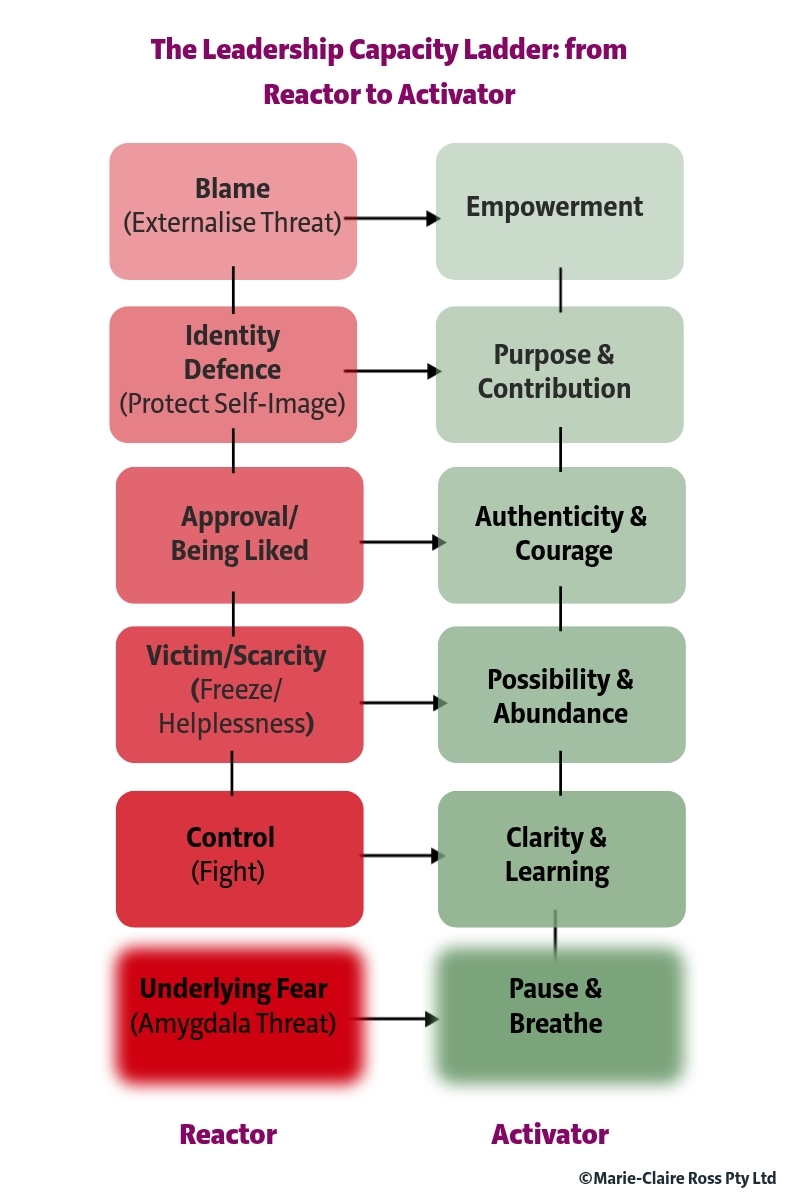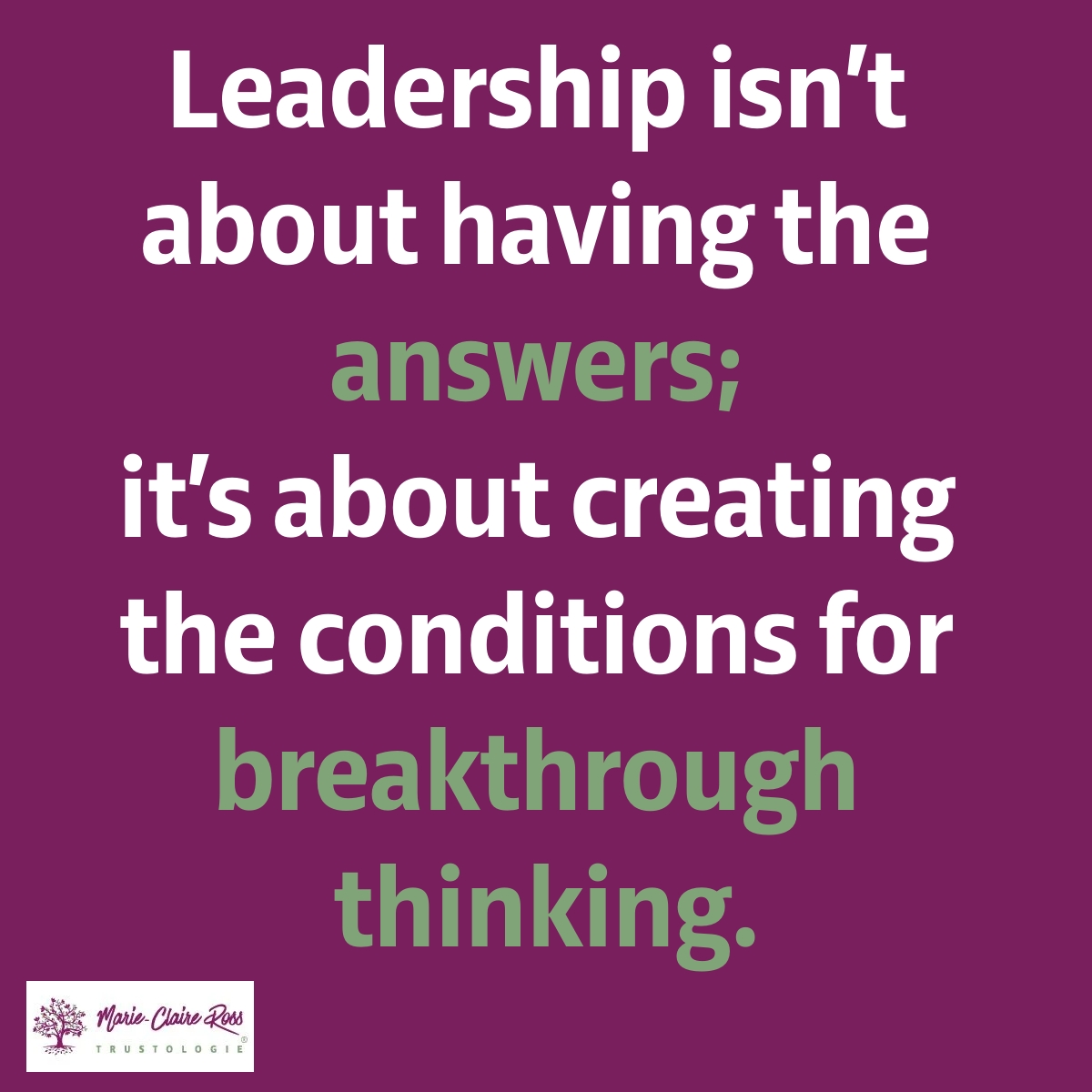5 min read
Why Great Leaders Thrive When Good Ones Fail During a Workplace Crisis
Implementing change in the workplace often creates pressure, uncertainty, and emotional reactions - especially during a workplace crisis. Successful...
Develop leaders, strengthen executive teams and gain deep insights with assessments designed to accelerate trust and performance.

Transform how your leaders think and perform with keynotes that spark connection, trust and high-performance cultures.

Explore practical tools, thought-leadership and resources to help you build trusted, high-performing teams.

Trustologie® is a leadership development consultancy founded by Marie-Claire Ross, specialising in helping executives and managers build high-trust, high-performing teams.


The pandemic has been a game-changer in so many aspects. In the workplace, it has really crystallised what we want in our work experience.
For many people they have realised they don't want to work for a boss or company that is unclear about directives or keeps making promises, but never delivers. They don't want to work really long hours because there aren't enough staff to help out. They don't want to feel undervalued or stressed by unrealistic deadlines. Nor do they want to be in a company that doesn't care about their people and thinks fixing employee mental health is about providing more perks (rather than fixing the jerks).
Interestingly, there has been a big realisation that work needs to add to your life, not detract. Today, it is beginning to look really weird that work can harm you - either psychologically or physically. We have known this for years, but now it is starting to look as outdated and as unhealthy as supermarket white bread. And just as tasteless.
Perhaps it's time that all leaders need to sign the equivalent of the Hippocratic oath. Doctors have to pledge that they won't intentionally harm patients. Maybe leaders need to pledge that they won't harm employees or customers both psychologically or physically. Of course, we would also need employees to sign one as well.
What I like about have a pledge of doing no harm is that it brings awareness to people, especially leaders, that their actions can create a world of chaos and despair. And they need to stop it.
In the work I do, I still find leaders who:
We all want to be in a team where we are happy, productive and don't dread going to work. A place where we can relax and be ourselves knowing that the people around us aren't going to make us feel unworthy or defective. As human beings, we all want to be trusted. To be given opportunities, to be valued, appreciated and to feel like we belong to our team. We all deserve to go to work and leave feeling better about ourselves than when we first walked in.
This starts with a trusted leader. A leader who does the right thing by people and who ensures all of their staff members are thriving, not surviving. A leader who positively impacts people's wellbeing, not diminishes it.
Ask any leader, if they are trusted and the majority will say yes. We feel it's like a badge of honour to be trusted, but we fail to understand is that we all have good days and bad days. I've coached many leaders who believed they were trusted, but they had no idea how much anxiety and fear they were generating in their direct reports during their grumpy days.
Honestly assessing our flaws and admitting them can be key to being more trusted. Letting people know that you had a bad night’s sleep or that you aren’t yourself is a much better option than taking out your frustrations on others. That’s why I believe having to sign an oath of no harm to others is a game-changer for leaders. It helps them become more aware of their own behaviours that not only upsets others, but themselves long term.
In my research in companies, what I have found is that building trust is all about leaders who have consistently practised the right combination of skills that foster a thriving workplace (if you want some tips on how to do this, check out my book, TRUSTED TO THRIVE: How leaders create accountable and connected teams). It’s about a leader who has taken time to understand and observe the human condition - what drives people to be their best and what shuts people down - and who compassionately responds to each individual in a manner that suits them best.
But you can only do this well if you have the self-awareness and humility to work on improving habits and behaviours that make things difficult for all around you. The objective being that you get to a stage where you are improving people’s lives and creating a healthy, productive team culture effortlessly.
So how do you know that you’re a trusted leader?
In my mind, the real difference between a good leader and bad leader is that a good leader leaves a hole when they leave, while a bad leader puts people into a hole.
What type of legacy do you want to leave for your people?

5 min read
Implementing change in the workplace often creates pressure, uncertainty, and emotional reactions - especially during a workplace crisis. Successful...

7 min read
Navigating difficult conversations at work isn’t just a “nice to have” leadership skill – it’s the fault line that often separates healthy,...

8 min read
When my daughter was 17 months old, she discovered a superpower: the word “Why?”For the next two years, it was her response to almost everything.

Cast your mind back to when you last had a face-to-face meeting in your leadership or management team. What did you talk about? Typically, most...

Recently, one of the biggest complaints that I have been hearing about leaders is how a lack of self-awareness is impacting their performance....

Recently, I have noticed a lot of my coaching clients are finding their roles difficult because of behaviours from the top.